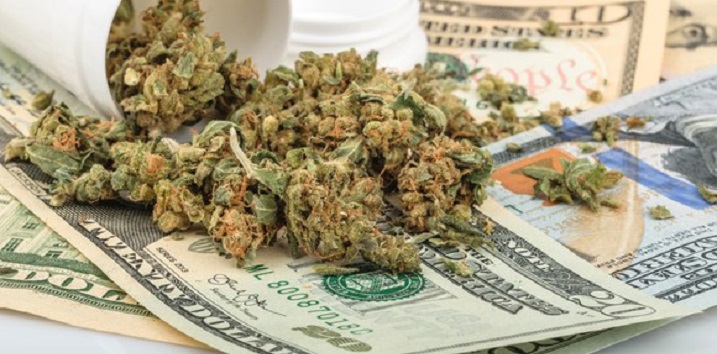Industries with sluggish sales are watching the emergence of the cannabis industry. In this post from Nasdaq.com read about the 3 industries that are looking to partner with marijuana stocks.
The cat is out of the bag: Marijuana is big business. And in Canada, it’s just over six weeks away from becoming legal business.
On June 19, after months of debate within the Senate, and nearly two weeks of back-and-forth between both houses of Parliament, Canada officially passed the Cannabis Act , legalizing recreational marijuana. Shortly thereafter, Prime Minister Justin Trudeau set a date of Oct. 17, 2018, whereby adult-use cannabis would officially go on sale in licensed dispensaries. We’re simply that close to what could be billions of dollars a year rushing into Canada’s weed industry.
These industries could look to cannabis to reignite growth
As you might imagine, investors have definitely taken notice. The North American Marijuana Index — an index comprised of a few dozen of the most influential growers, ancillary pot stocks, and cannabinoid-based drug developers, in North America — is once again closing in on a tripling in its value over the trailing-12-month period. The green rush is expected to result in healthy profits for pot stocks up and down the supply chain, and investors simply don’t want to miss out.
But they’re not the only ones paying close attention to the green rush in Canada. Three industries with sluggish sales and a desire to reignite growth may be looking to partner or acquire marijuana stocks in the quarters that lie ahead.
Alcohol
If there’s one industry that’s clearly out to find cannabis partners, it’s the alcohol industry. According to the 2017 “Monitoring the Future” survey, which questioned nearly 44,000 students in the eighth, 10th, and 12th grades, cannabis approval is rising among students and (according to the students) their parents, while disapproval for binge drinking rose slightly since the mid- to late-1970s through 2017. This suggests the genuine potential for the younger generation, once old enough, to legally trade off alcohol for pot products in legal states.
Consequently, we may already be seeing this weakness manifest itself in some alcohol stocks. For example, Molson Coors Brewing (NYSE: TAP) has seen a pretty steady decline in beer market share in Canada over the past decade, and reported a constant-currency sales decline of 6.3% during the second quarter. Sales in the U.S. fared only slightly better, with a 3.1% constant-currency decrease. Understanding that it needs to find ways to reignite growth, Molson Coors Canadaannounced a joint venture with Hydropothecary Corp (NASDAQOTH: HYYDF) on Aug. 1.

Under the terms of their joint venture, Molson Coors will control 57.5%, with Quebec-based Hydropothecary in control of the remainder. The duo will primarily focus on nonalcoholic, cannabis-infused beverages, although it’s worth noting that infused beverages won’t be legal once the green flag waves on Oct. 17. Canada’s Parliament is widely expected to take up discussion on, and legalize, new forms of cannabis use in 2019, and it’s likely that Molson Coors and Hydropothecary are simply trying to get ahead of the curve, and demand.
It’s also been rumored that Diageo — best known for its Captain Morgan, Smirnoff, and Guinness brands — might be looking to enter the cannabis space. Alcohol companies are looking for a growth spark, and marijuana might be able to provide it.
Tobacco
Interestingly enough, it’s not just alcohol that should be worried about the emergence of the cannabis industry.
The “Monitoring the Future” survey found that students believe their parents would have an even more negative view of smoking tobacco regularly in 2017 than they did four decades ago. With developed countries such as the U.S. and Australia doing what they can to raise health awareness surrounding tobacco, the industry has seen steadily declining shipment volumes and usage rates. In the U.S., adult cigarette use rates have fallen from more than 42% in the mid-1960s to 15.5% as of 2016. Though pricing power remains strong with tobacco producers, they’re still looking for ways to provide some organic pop to their top line — and cannabis might be the answer.

In late June, U.K.-based Imperial Brands (NASDAQOTH: IMBBY) , which produces the Kool and Winston cigarette brands, became the first Big Tobacco stock to dip its toes in the water with a cannabis investment in Oxford Cannabinoid Technologies (OCT). As the name implies, OCT will seek out and/or develop cannabinoid-based medicines that have the potential to help patients. Although Imperial Brands’ stake in OCT wasn’t disclosed, it nevertheless signals its interest, and that of Big Tobacco, in the marijuana space. In Imperial Brands’ first-half results for 2018, reported on May 9, it showed a 2.1% decline in total tobacco volume.
Though we haven’t seen any other tobacco investment in the cannabis space as of yet, this could simply be a function of Canada approving only dried flower and oils for sale as of Oct. 17. Once vaporized cartridges become available, along with edibles, concentrates, and other forms of use, Big Tobacco might be more willing to jump in.
Pharmaceutical
Lastly, when is Big Pharma not hungry for growth? With the Trump administration having threatened on numerous occasions to crack down on pharmaceutical pricing power, as well as Big Pharma constantly contending with patent expirations on key products, an investment in the cannabis industry could make a lot of sense.
The biggest catalyst here might be the recent approval of GW Pharmaceuticals ‘ (NASDAQ: GWPH) Epidiolex as a treatment for two rare forms of childhood-onset epilepsy. GW Pharmaceuticals’ lead drug is a cannabidiol (CBD)-based oral solution — CBD is a non-psychoactive cannabinoid best known for its perceived medical benefits — which became the first cannabis-derived drug to gain approval from the U.S. Food and Drug Administration on June 25. Since Schedule I drugs in the U.S. are defined as (among other things) having no medical benefits, GW Pharmaceuticals’ approval creates sort of acannabis conundrum . It also demonstrates that cannabinoid-based drugs could play a role in the future for certain ailments.

Though they’ve flown largely under the radar, we have witnessed a few select instances where Big Pharma has demonstrated interest in cannabis. For instance, Business Insider reported earlier this year that Johnson & Johnson (NYSE: JNJ) allowed two medical cannabis businesses, Avicanna and Vapium Medical, access to its Canadian JLABS Innovation network. The idea behind this partnership between Johnson & Johnson and Avicanna/Vapium Medical is to allow medical weed researchers the opportunity to “pick the minds,” so to speak, of J&J’s lead researchers, as well as for Johnson & Johnson to see what these medical weed businesses are capable of. If it likes what it sees, J&J could become an investor.
Look for Big Pharma to give the green rush a serious look in the months and years that lie ahead.
Featured image source: Getty Images.
Source: 3 Industries Looking to Partner With Marijuana Stocks – Nasdaq.com

